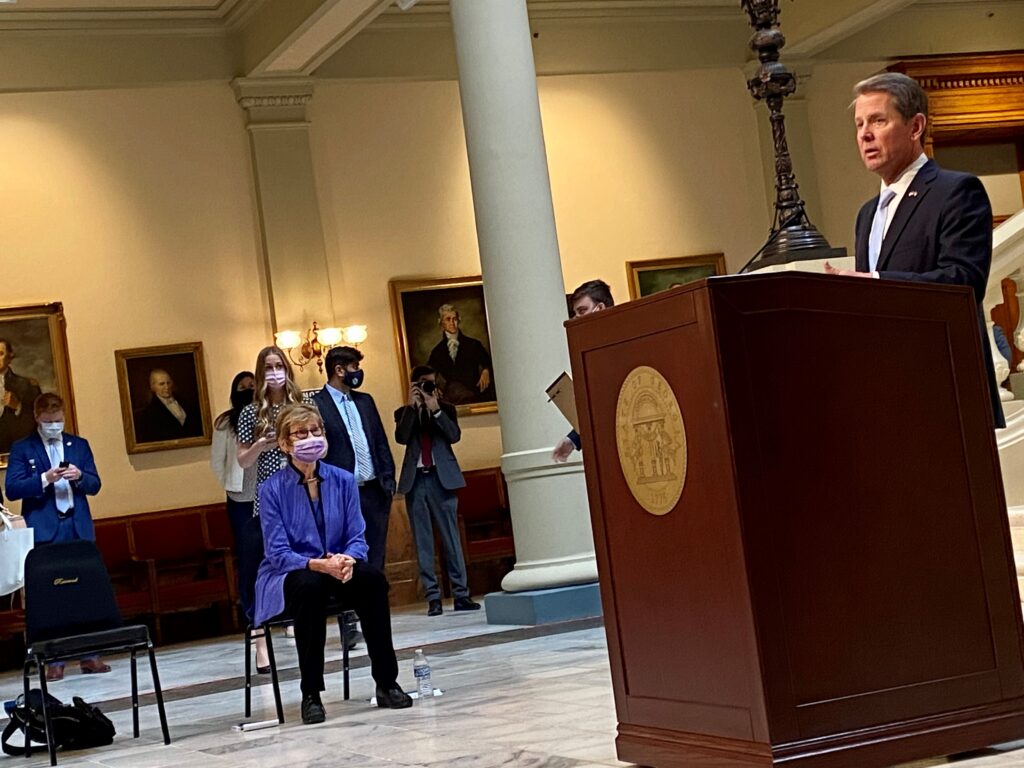
Georgia has not yet reached the halfway point in giving first doses of COVID-19 vaccines to the roughly 2 million people currently eligible more than a month after the state’s distribution program began, Gov. Brian Kemp said Tuesday.
The number of shots administered to Georgia health-care workers, nursing home residents and staff, first responders and people ages 65 and older has gone up in recent weeks after a halting mid-December start, Kemp said at a news conference in the state Capitol.
Kemp’s office announced Tuesday night the Biden administration will start allocating Georgia an additional roughly 25,000 vaccine doses per week. That will increase Georgia’s current weekly allotment to 145,900 doses, Kemp’s office said – an amount still lagging far behind the millions of doses needed to halt the virus’ spread.
“Although we still expect demand to far exceed supply for the foreseeable future, this is no doubt welcome news, and we will work around the clock to get these vaccines distributed and safely administered as quickly as possible,” Kemp said in a statement Tuesday night.
Kemp had earlier on Tuesday said his office did not know when the federal government would allocate more vaccine doses, saying he had not yet spoken directly with the new Biden administration and that he did not expect Georgia’s weekly allotment “to change certainly for the next few weeks.”
As of Monday, nearly 714,000 vaccines had been administered to the initial round of Georgians eligible to receive them, said state Public Health Director Dr. Kathleen Toomey. Health departments across the state have enough vaccines to schedule second doses for people who have received their first, she said.
More than 99% of the state’s nursing homes have also been supplied vaccines through a federal partnership with CVS and Walgreens pharmacies, Kemp said. He has set a goal to vaccinate all of Georgia’s nursing home residents and staff by the end of this month.
But limited shipments from the federal government have kept state officials so far from expanding which Georgians can be eligible for the vaccine to school teachers and other at-risk groups such as those with developmental disabilities, Toomey said.
“All this is dependent on the availability of vaccine,” Toomey said at Tuesday’s news conference.
Vaccine providers have also met resistance from some nursing homes and hospitals where people have refused to take the vaccine. Kemp said some nursing homes saw up to 70% of staff refuse the vaccine early on during the rollout, while as many as 50% of employees in some hospitals refused it.
“I think they should get it,” Kemp said. “That was one of the reasons that we expanded the criteria … to people 65 and older.”
The governor added officials are creating a statewide vaccine scheduling and tracking tool as local health departments field a flood of calls for the few available appointments, but more work is needed before that tool can go online.
“Doing that prematurely could be disastrous,” Kemp said.
Meanwhile, the number of hospitalizations and positive case rates from COVID-19 has fallen in recent days amid a rough winter spike that began in November, Kemp said. He urged Georgians to continue wearing masks, washing hands and keeping their distance from others despite the downward trend.
“We cannot take the improving numbers we’re seeing for granted,” Kemp said.
More than 722,000 people had tested positive for COVID-19 in Georgia as of Monday afternoon, with nearly 150,000 more reported positive antigen tests indicating likely positive results. The virus has killed 11,854 Georgians.
This story was updated to note Kemp’s office announced late Tuesday the Biden administration will start allocating Georgia an additional roughly 25,000 vaccine doses per week.
